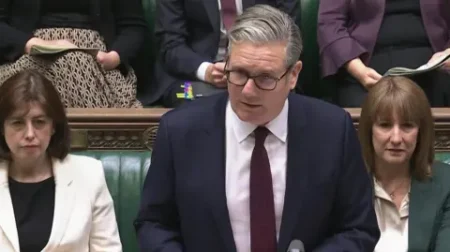**Bin Strike Talks Collapse Amid Council Withdrawal**
Negotiations regarding the ongoing bin strike in Birmingham have reached an impasse, as council leader John Cotton declared that the local authority is “walking away” from the dialogue. The break in talks signifies a turning point in a dispute that has significantly impacted the city since its initiation in January. The strike escalated to an all-out boycott of waste collection services in March, leaving Birmingham’s streets littered with heaps of uncollected rubbish.
Conciliation service Acas played an intermediary role in the discussions, which have been ongoing since May. Cotton stated that the council has now “reached the absolute limit” of what it can offer in terms of proposals to resolve the dispute. He asserted that while the council had negotiated in good faith, all offers made had been rejected by the union involved, which has yet to release a statement on the matter.
As the breakdown in negotiations was announced, Birmingham continued to see the effects of the strike. Residents have witnessed mounds of rubbish piling up since collections ceased, raising concerns over health and sanitation. Cotton emphasized that the council plans to advocate for necessary changes to improve the waste service, despite potentially impacting staff jobs in the process.
Despite the dire circumstances, Cotton mentioned that the council is committed to addressing risks associated with equal pay while also looking for ways to enhance operations within the waste management service. He explained that this plan would include job cuts among the waste service staff, albeit with options for voluntary redundancy and opportunities for training and redeployment across different departments within the council.
The union, representing the striking workers, noted that 170 employees could potentially face significant salary reductions of up to £8,000 annually due to the council’s plans to eliminate Waste Recycling and Collection Officer (WRCO) roles. However, council representatives have maintained that under their latest proposals, far fewer workers would be subjected to pay cuts.
Cotton underscored the council’s intent to continue with contingency bin collections while aiming to restore normalcy by resuming recycling and green waste services. He expressed his dedication to creating an “efficient and improved service” that aligns with the city’s objectives, while also avoiding the jeopardization of the financial recovery that Birmingham has been striving for.
In light of the council’s current situation, opposition leader Robert Alden pointed out the urgent need for the waste management services to be reestablished, emphasizing the importance of getting the bins emptied and streets cleaned. Alden has previously advocated for setting firm deadlines and realistic expectations in negotiations, rather than permitting a continuous shift in goals without resolution.
Birmingham City Council is under pressure to improve its recycling rates, which currently stand at 22.9%, one of the lowest among unitary authorities in the UK, especially when considering acceptable benchmarks set by the government to achieve a recycling rate of 65% by 2035. Failure to meet these targets could lead to reductions in grant funding, adding further strain to the authority.
Cotton articulated that while he is open to productive discussions with the union, he prioritizes the community’s needs and the delivery of a functional waste service. The public’s well-being remains a key component in this ongoing challenge, as Birmingham grapples with not just waste management issues, but broader implications for community health and environmental sustainability.
As both sides cling to their respective positions, it remains to be seen how this dispute will unfold and what the definable next steps may be toward restoring regular bin collections in Birmingham. The conflict serves as a reflection of larger themes in labor negotiations, public service delivery, and municipal governance, underscoring a critical juncture for the city’s administration and its residents.











